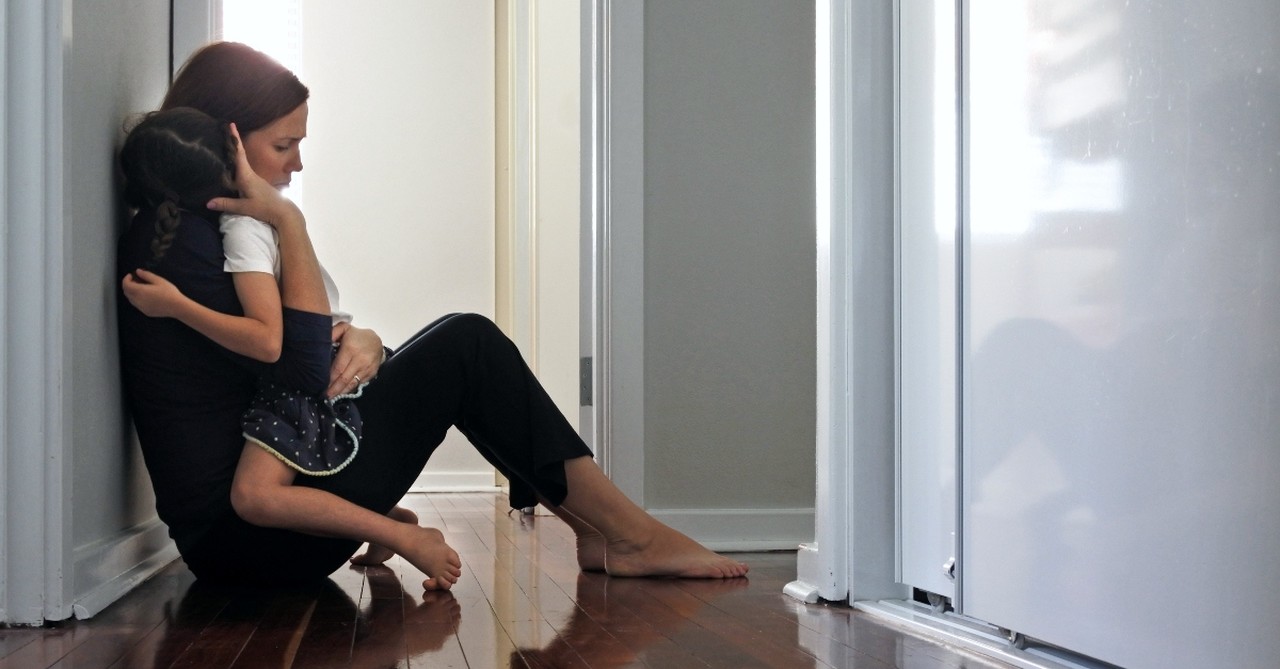
When my older daughter was about four years old, she tipped too far back in the little plastic chair she often sat in to look at picture books and hit her head against the fireplace hearth. As soon as I heard her cries, I sprang into action, holding her and comforting her, examine the cut on the back of her head, calling the doctor for advice, bringing her into the pediatrician’s office for stitches, calling preschool to let them know she wouldn’t be there that day, giving her pain medicine, buying her ice pops. I knew what to do for that kind of hurt.
But when our kids’ hearts are hurting—when they don’t get what they want, or they get something they don’t want, when life wears them down, when their spirits have been scraped up—our course of action as parents is less clear. Yet, we still long to spring into action and help them.
As with all of life‘s conundrums, the best ideas about what to do have been around for a long time and are, in fact, God’s ideas. I love that the Bible is an ancient, unchanging text entirely relevant for our current, constantly changing times. In its chapters and verses, I find these eight ways we can care for our kids’ emotional cuts and bruises, based on advice from the world’s only perfect parent, Abba Father.
Photo Credit: ©iStock/Getty Images Plus/chameleonseye
1. Pray for Them

1. Pray for Them
SLIDE 1 OF 5
In his namesake book, James, the brother of Jesus, asks a question: “is anyone of you in trouble?” (James 5:13 NIV). He answers with three straightforward words: “He should pray.” No intermediary steps. No hemming and hawing. No, “well, try this first and if it doesn’t work, go ahead and pray.” Just “trouble,” immediately chased by prayer.
When we pray for our troubled children as a customary first course of action, we reassure them that the help we are going to offer does not originate in our weak, imperfect selves but rather in the unfailing strength of the all-wise God. We also establish for them a protocol they can follow when they are hurting and we are not around to help.
2. Sit with Them in Their Sorrow
As parents, our natural response when our children are struggling is usually to try to help them get past that hard place as quickly as possible. But faith is often refined in the fire, and so sometimes we need to sit with our children in their trouble for a while rather than trying to lift them as quickly as possible out of it.
When the Bible councils us to “mourn with us those who mourn” (Romans 12:15 NIV), it is directing us to match others’ emotions with the same emotion—to give weight to what they are feeling by allowing it to press down on our own minds and hearts. We want our children to experience times of rejoicing, and when they do, we eagerly add our joy to theirs. But when they are hurting, and we hurt with them, we offer the tender balm of letting them know they are not alone in their pain.
Photo credit: ©GettyImages/ThitareeSarmkasat
3. Feed Them

3. Feed Them
SLIDE 2 OF 5
I made cookies for my big kid the other day. Like the biblical Hannah, my young adult’s face was “downcast” (1 Samuel 1:18b NIV), so I wanted to try to do something about it. I’m the mom of two daughters, so I’ve seen my share of downcast faces. And while I don’t normally refer to them in this manner, in this instance, I was following Hannah’s lead: “Then she went her way and ate something, and her face was no longer downcast.”
I know there are those who believe food should never be used to comfort, but I submit that Hannah’s example shows us that nourishment, used judiciously, can be a tool we use to feed and strengthen not only our kids’ bodies but their spirits as well.
4. Make Them Laugh
When my younger daughter was in middle school, she looked for a time as if she’d lost her best friend. Actually, in a way, she’d lost her two best friends. Both girls were, thank goodness, still living, and both still wanted to be my daughter’s friend. But both were exiting my daughter’s life from the places she had known them—from school and from church—and she was deeply saddened.
One day, very early in the adjustment period, we came home from a school event, and my troubled middle schooler was summoned into the living room by her big sister. A few minutes later, I could hear the sound of both of them laughing uproariously. My older daughter had dug out an old camera, and within minutes, both girls were howling with laughter, making fun of old pictures and videos of themselves. From two rooms away, I knew I heard the truth of Proverbs 17:22 (NIV): “a cheerful heart is good medicine, but a crushed spirit dries up the bones.”
Photo credit: ©Unsplash/Bruno Nascimento
5. Lighten Their Load

5. Lighten Their Load
SLIDE 3 OF 5
There’s a lot of buzz in parenting circles about not doing things for our kids they can do for themselves. The often-valid idea here is that we do our children no favors if we send them out into the world ill-equipped to be independent and capable. But God is God of relationship. He designed us to live in connection with each other, and I don’t find anywhere in the Bible where He says we age out of this at 18 or 21 or 51. He gave us each other to help each other, and that seems to be a lifetime arrangement. “Suppose a brother or a sister is without clothes and daily food. If one of you says to them, ‘Go in peace; keep warm and well fed,’ but does nothing about their physical needs, what good is it?” (James 2:15,16).
I’ve found one of the best ways to help my children when they’re hurting is, in fact, to do some things for them they can do for themselves but maybe don’t necessarily like to do or don’t have the time or energy to do: throw in a load of their laundry, pack them a lunch, fill up their car with gas, find something they’re missing.
I don’t do these things for them because they can’t, but because I can; I don’t do them because they won’t but because I’m willing. This is family and life in relationship, and when life outside the walls of our homes gets bumpy, extra service to each other inside our homes can smooth the way.
Photo credit: © Getty Images/Ghislain & Marie Davidde Lossy
6. Speak Encouraging Words

6. Speak Encouraging Words
SLIDE 4 OF 5
From the moment our children are born, parenting is by and large about doing. We spend our time caring for, feeding, protecting, teaching, instructing, checking on, driving, and showing up for our kids. We do this when all is well and especially when it isn’t. But the older they get, the less their rough spots are something we can or even should do anything about. This is where the power of our words has to carry the day.
Fortunately, our heavenly Father reminds us in His Word that our words can indeed make a difference: “Worry weighs a person down; an encouraging word cheers a person up” (Proverbs 12:25 NLT). Witness, for example, five words from the biblical Elizabeth to arguably (at that moment) one of the most troubled teenagers in the history of the world…Mary, a young girl, unmarried but pregnant, trusting in a message of a divine favor delivered to her without witnesses by an angelic visitor: “When Elizabeth heard Mary’s greeting, the baby leaped in her womb, and Elizabeth was filled with the Holy Spirit. In a loud voice, she exclaimed: ‘Blessed are you among women, and blessed is the child you will bear! But why am I so favored, that the mother of my Lord should come to me?’” (Luke 1:41-42 NIV).
“Blessed are you among women.” When, in her troubled state, Mary hurried to seek encouragement from a mother-like figure who was only at last preparing to be a mother herself, those five words—absent any action—must have surely cheered her weighed-down spirit up. And our words of encouragement can do the same for our older kids’ own burdened minds and hearts.
Photo credit: ©GettyImages/digitalskillet
7. Share Your Own Struggles

7. Share Your Own Struggles
SLIDE 5 OF 5
When our kids (or anyone, really) are struggling, the last thing they want to hear is, “I know how you feel,” followed by our own story of heartbreak or disappointment. But after we have offered other forms of comfort, it can be useful to give them perspective—to let them know that, while what they are going through is uniquely theirs, there are also pieces of it that resemble what others, including their parents, have gone through. “All praise to God, the Father of our Lord Jesus Christ. God is our merciful Father and the source of all comfort. He comforts us in all our troubles so that we can comfort others. When they are troubled, we will be able to give them the same comfort God has given us” (2 Corinthians 1:3-4 NLT).
Looking at us, our kids can see living proof that the waters indeed did not sweep over us, nor did the flames consume us (Isaiah 43:2 NIV), and neither will the fire or the flood consume or sweep over them if they cling to faith in the Rock that is higher than they (Psalm 61:2 NIV).
8. Give Them Perspective
The part of our children’s brains that can think very far into the future does not fully develop until they are about 25 years old. For this reason, when our kids are experiencing heartache, they may be inclined to think it will never get better, that this trial is the sum total of their existence for the foreseeable future. (To be honest, I do the same thing, and I am well beyond 25 years old.)
At this point in parenting, I’ve found one phrase to be reliably helpful: “this is not your whole story.” Whatever is troubling our kids at any given time is not all there is to their lives, and it is all is not all there ever will be to their lives. “And I am sure of this, that he who began a good work in you will bring it to completion at the day of Jesus Christ” (Philippians 1:6 ESV). This promise speaks of process, which often cannot be rushed, so our role as parents is to help our kids hold onto hope while God is adding onto the structure of good work He began building in them when their lives began.
My daughter’s head healed quickly from her run-in with the fireplace hearth. Many years later, though, when her heart was broken, recovery took much longer. Our kids’ emotional pain is often slow to repair. But we can comfort our kids with words and actions, encouraging them to fix their eyes on Jesus, who endured pain of every kind “for the joy set before Him” (Hebrews 12:2 NIV). And then we hand off to them the baton of hope that joy is set before them, too.

Originally published September 24, 2021.







